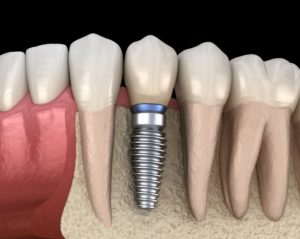 If you have a missing tooth, dental implants sound like an excellent deal; they’ll let you eat whatever you want and are far more stable and secure that traditional dentures. But while the success rate is very high, no treatment is completely free of risk. Implants are meant to stop bone loss in the jaw, but sometimes it happens anyway; learn about the risks and be prepared to protect your new smile.
If you have a missing tooth, dental implants sound like an excellent deal; they’ll let you eat whatever you want and are far more stable and secure that traditional dentures. But while the success rate is very high, no treatment is completely free of risk. Implants are meant to stop bone loss in the jaw, but sometimes it happens anyway; learn about the risks and be prepared to protect your new smile.
Why Does Bone Loss Happen, and How Do Dental Implants Stop It?
Your jawbone is kind of like your muscles: it needs to be used or you’ll start to lose it. Your teeth stimulate your jaw through chewing, which keeps the bone they’re attached to healthy and strong. A lost tooth means that part of the jawbone will no longer receive this benefit, and it’ll start to deteriorate over time.
Dental implants are the only form of tooth replacement that can help prevent bone loss. This is because they actually replace the root of the tooth in the jawbone, which lets it provide the stimulation it needs. As a result, it’ll be easier to maintain a healthy, youthful-looking facial structure.
Can Bone Loss Still Happen with Dental Implants?
Unfortunately, tooth loss is just one possible cause of bone loss in your jaw, which means it can still occur even after implant surgery. Other factors include:
- Gum Disease: When an infection in your gums becomes too advanced, it starts to destroy bone tissue. You may be at a higher risk of infection while you’re waiting for your mouth to heal after surgery.
- Medical Conditions: Osteoporosis and Paget’s disease of bone can lead to dental bone loss. Some tumors can also cause deterioration.
- Physical Trauma: If the area around the implant becomes damaged due to a blow to the face or another injury, the bone might stop receiving stimulation.
If you notice any problems or worrisome symptoms around the implant site (such as looseness or swelling), call your dentist as soon as possible. You’ll have the best chance of saving your new tooth if you get treatment quickly.
How Can I Prevent Bone Loss?
Luckily, taking care of your implants and preventing bone loss can both be easily accomplished with good oral hygiene habits. This includes:
- Brushing at least twice a day with fluoride toothpaste and a soft-bristled toothbrush.
- Flossing between every tooth daily. (Water flossers and interdental brushes can help if you have trouble using traditional string floss.)
- Eat a well-balanced diet with plenty of calcium.
- Rinse with an antibacterial mouthwash to decrease the risk of infection.
- Visit your dentist at least twice a year.
The most important thing to remember is that prevention is always preferable; bone loss, gum disease and other oral health issues can be treated, but to give your dental implants the best chance of success, it’s best to avoid such problems altogether!
About the Author
Dr. Mark E. Lawton has been practicing dentistry for almost two decades now and enjoys forming meaningful, trusting relationships with his patients. He received his Doctor in Dental Surgery from the University of Texas Health Science Center at San Antonio Dental School and has the training and experience needed to personally place a dental implant. To schedule an appointment at his Houston practice, visit his website or call (281) 447-2186.